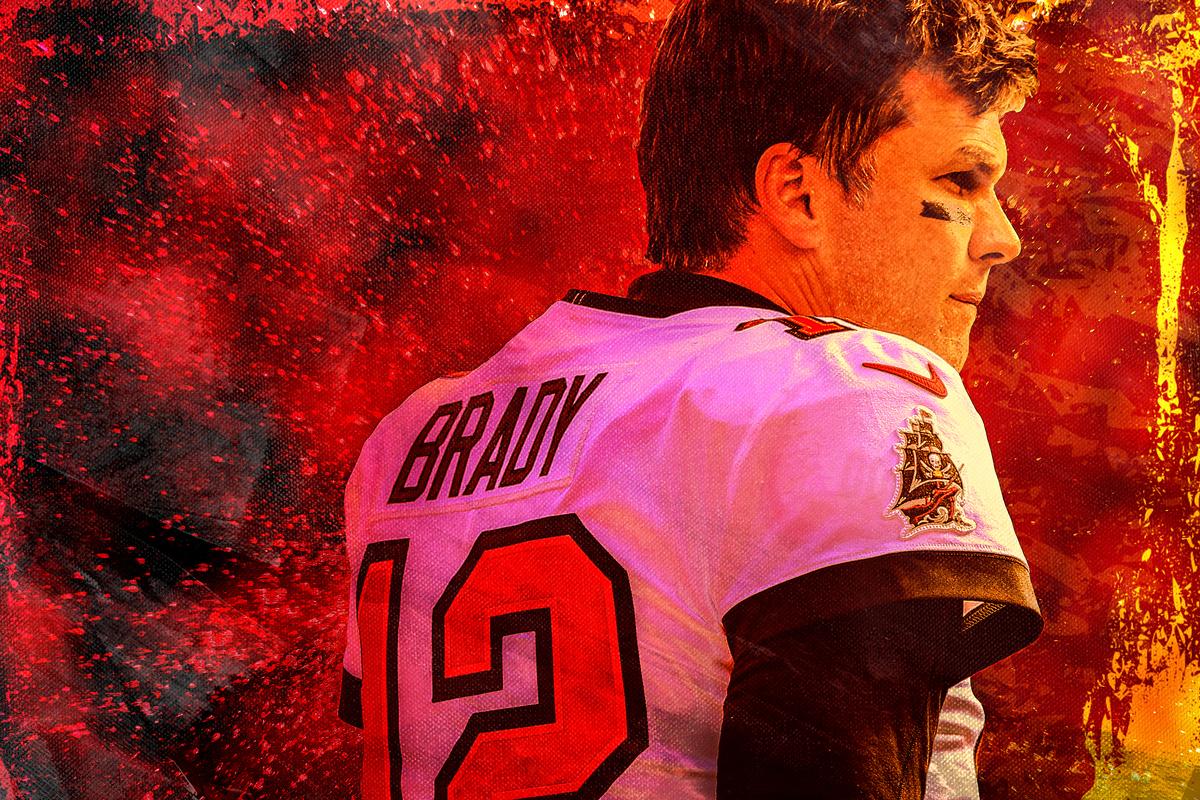
Cristiano Ronaldo scored a hat trick in Manchester United’s 3-2 win over Tottenham Saturday, becoming FIFA’s all-time leading scorer with 807 goals at the age of 37. It was a dazzling performance and evidence that while greatness can lie dormant, it is rarely stamped out entirely in special players. In a box at Old Trafford, Tom Brady watched the game with his two sons and joined in a standing ovation for Ronaldo when he was substituted out of the game shortly after his third goal. After the game, Brady brought his kids onto the field, where Ronaldo gave Brady’s younger son, Ben, his game jersey. Brady and Ronaldo chatted about their families for a bit before the five-time Ballon d’Or winner asked if Brady was really retired. Brady responded with what looked like a forced smile.
The next day, Brady un-retired.
“These past two months I’ve realized my place is still on the field and not in the stands. That time will come. But it’s not now,” he posted on social media.
Brady’s retirement lasted 40 days. For reference, he has played 47 playoff games in his nearly 23-year career. Extended vacations in beautiful places got boring, I guess. Perhaps he couldn’t find a new hobby. Family time is lovely, but most of us can probably agree that 40 days of it might spur a reevaluation or two.
Brady’s return may have come as a surprise, but it’s nowhere near as surprising as the fact that he ever retired in the first place. Given how many times he’s listed playing until at least 45 as a goal, his initial announcement coming months before he’d hit that milestone (Brady’s birthday is August 3) was met with disbelief. Within days of making that decision, Brady himself seemed to be waffling. “Never say never,” he told sportscaster Jim Gray about possibly reneging on retirement. For weeks, Bucs personnel openly discussed a possible Brady return. “That door is never closed,” Bucs coach Bruce Arians said earlier this month at the NFL combine. “Whenever Tom wants to come back, he’s back.” That same day, general manager Jason Licht said he had a free agency plan if Brady did come back. “He’s Tom Brady,” Licht said. “If Tom Brady wants to come back, we’d welcome him back.”
From the moment that news of his retirement first broke, was then disputed and then confirmed, it has been hard to accept the notion that one of the sport’s most ruthless competitors would be ready to step away at the top of his game. Apparently, this was hard for Brady to accept, too. It is fitting that his un-retirement came so soon after watching another great athlete thrive on the field—Ronaldo’s performance, perhaps, was the last straw for Brady’s inner peace with the idea that he was done competing.
“Football, as far as I’m concerned, is his first love,” Gisele Bündchen said in Brady’s 2018 documentary series Tom vs. Time.
Bündchen, if you weren’t aware, is Brady’s wife, and therefore some expert on the subject. She seemed to be laughing, but not kidding, when she made that statement. “I think it’s his main love, really, quite frankly,” she goes on. “It’s true!”
That love manifests as obsession. Fanfic message board–level obsession, and maybe beyond that—even the most intensely devoted athletes probably wouldn’t give up several food groups out of dedication to their passions. As a general rule of thumb, the obsessed don’t make for good retirees.
Brady has spoken before about not knowing how he’ll fill the space that football occupies once he’s done playing. Last May, Brady mentioned some angst over not being sure how he’d handle retirement.
“I think there’s a lot of time and energy still focused on being a great quarterback that, when that’s done—although I am a little fearful of it ending—I am open to the belief that there will be a lot of opportunities for me to do things that I haven’t had a chance to do,” Brady said.
Brady lives to compete. That’s why his retirement never made total sense in the first place and the reason why it makes so much sense that he changed his mind. His competitiveness is the simplest rationale for his decision-making and it extends not just to his choice to return, but to all the factors that contributed to the timing.
It’s no accident that Brady announced his return on the eve of free agency, leaving Tampa time to leverage his presence to attract players with the draw of winning a championship and basking in Brady’s glow for at least another season. Within hours of his statement, the Bucs had re-signed center Ryan Jensen on a three-year deal—Jensen had seemed like a candidate to sign elsewhere. It remains to be seen if Brady’s presence can change the calculus for other Bucs free agents like cornerback Carlton Davis or tight end O.J. Howard (the team has already lost guard Alex Cappa to the Bengals). Don’t be surprised if Brady restructures his deal to free up some salary cap space. The timing of his return keeps Tampa’s competitive window wide open for at least another season.
Brady’s announcement specifically mentioned that he was coming back to play for the Bucs, and he reportedly called players like Jensen to inform them he was returning and persuade them to re-sign.
There has been speculation that Brady wanted to keep playing all along, but was using his retirement as leverage to try to force a trade out of Tampa, perhaps to his hometown 49ers. To me, the fit seems a little suspect. Jimmy Garoppolo wouldn’t appeal much to the Bucs as a trade candidate, as he’s a bad match for Arians’s offense full of five- and seven-step dropbacks, and it would be a massive course change for San Francisco to give up on getting Trey Lance in-game development for a second consecutive season. Plus, Bucs leadership made it clear at the combine that they would be hard-pressed to trade Brady elsewhere if he did return, even at his behest—“bad business,” Arians said. So even if Brady’s preference were to switch teams, he may have learned sometime in the past 40 days that it wasn’t possible. In any case, his desire to keep competing trumped any other concerns he may have had.
Throughout the years, Brady’s most watertight statement is this one: “When I suck, I’ll retire,” Brady told Boston sports radio station WEEI in 2014. “But I don’t plan on sucking for a long time.” It’s 2022, and the only thing Brady has been bad at so far is retirement.

